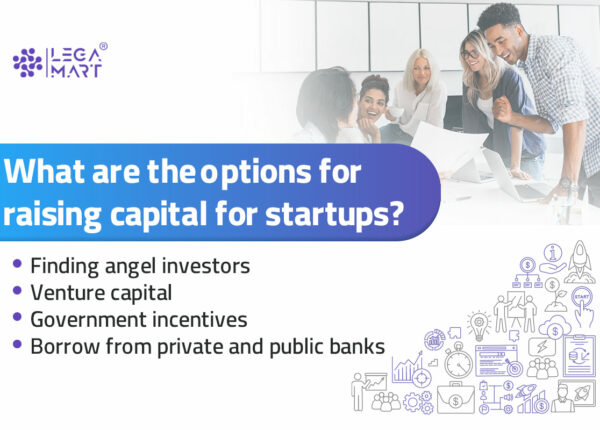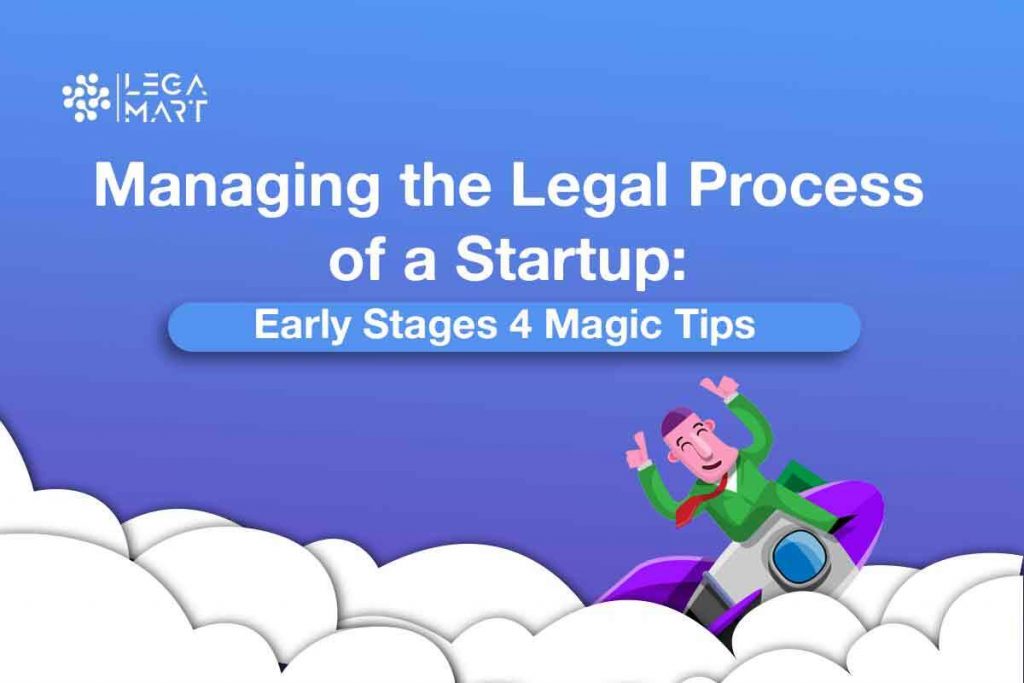However, beneath the surface of ground-breaking ideas and boundless enthusiasm lies a complex web of legal process of a startup that can either propel or hinder their success. Managing the legal complexities of a startup during its early stages is a critical task that necessitates strategic foresight and careful navigation.
What is a Startup?

A startup is a company still in its early stages of operation, trying to figure out its business model through trial and error or not having one. It is started by one or more entrepreneurs who want to create a product or service that they believe will be in demand. It’s not like a typical corporation.
Having a brilliant idea is the key to starting a business. The next step is to conduct market research to establish how practical the idea is and what the present market for your idea looks like. Following the market research, the next stage is to write a business plan that explains your company’s structure, goals, mission, values, and objectives.
Legal process of a startup
These startup companies are known for rapid growth, uncertainty, and risk-taking and are generally formed in tech, finance, and more. Incorporating a startup separates it from its founders. This separation gives the business legal rights, responsibilities, and liabilities. Startup incorporation can be done by –
Choose a business structure
The startup founders must choose a legal structure. Partnership, LLC, sole proprietorship, and corporation are standard options. The structure affects taxation, liability, and ownership.
Name your busines
The startup’s name must be unique and must not be in violation of any trademarks. Check with the government agency if the name is available before getting it registered.
Draft articles of incorporation
Start-up founders must draft articles of incorporation documents such as AOA and MOA. This document describes the company’s purpose, location, stock, etc. It also helps in getting the investments for the company from Venture Capital and investor companies.
Appoint officers and directors
Boards and officers are required for the startup to start functioning correctly. Directors make major decisions and hold the management of the company, while officers run daily operations.
File documents and getting licenses
The founders submit the articles of incorporation or other documents to the Secretary of State. This step usually requires filing fees. The startup’s nature and location may require permits and licenses to operate legally.
Choosing the type of business

It’s crucial to know what kind of business you’re beginning. Is it a single proprietorship, a partnership firm, an LLP, or a private limited company? Each of these structures has its own laws and regulations governing registration, taxation, licensing, and other aspects of the operation.
Registration is not necessary for sole proprietors, and it is optional for partnership firms, but it is obligatory for LLPs and limited private corporations. Once you’ve decided which structure is ideal for your business, you’ll need to notify your secretary of state.
Because they require the least paperwork and setup time, most small firms begin as sole proprietorships or partnerships. On the other hand, these business forms do not provide adequate liability protection for business owners. A corporation or limited liability company (LLC) is usually a better option, especially if you plan to take out a business loan or raise venture money.
Legal Agreements required to start a startup
Trademark registration
As discussed above, registering a trademark for your company name can significantly improve the identity of your brand. It is important to note, however, that trademark registration activates alerts for similar-sounding names, allowing for potential objections. This may attract unexpected attention from parties who would not have previously noticed your brand.
Association/Incorporation articles
One must prepare the basic documents of the comapnies such as for the bylaws – AOA, MOA, pre – incorporation agreements between the promoters, co-founders agreement etc.
Non-disclosure agreement (NDA)
A Non-Disclosure Agreement (NDA) is the necessity of every startup as it is the first line of defense when dealing with clients, investors, or employees. NDAs safeguard the confidential information of your startup, including ideas and intellectual property. These agreements state:
Employement agreement
The startup shall define all the necessary conditions for the employee such as about the payment, roles, work – hours, and termination.
Shareholders agreement
This agreement is different from the other incorporation agreements. A Shareholder’s Agreement is required when seeking private investments. This document outlines shareholder rights, liabilities, and how to exercise those rights. It is critical for defining shareholder relationships and dealing with co-founder departures.
Intellectual property assignment agreements
Intellectual property (IP) protection is critical for startup success as most of the new startups are hevily dependent on their efficient tecgnology. Intellectual property assignment agreements ensure the ownership of valuable intellectual property. There are two main kinds:
- Technological Assignment Agreements: Shareholders transfer existing intellectual property to the company.
- Agreements for Invention Assignment: Employees’ innovative products or services become company-owned intellectual property.
These agreements increase the value of your startup, particularly for technology-focused businesses.
Incorporating these critical legal documents allows your startup to navigate challenges, protect assets, and lay the groundwork for future growth. If you need to read more about the agreements, we have dedicated blog on the contracts that founders/co-founders should know.
Business licenses
A business license is a permission provided by government entities that allow a company to operate within a particular jurisdiction. This license, in addition to the registration, is a state-level need for a business to operate. Generally, the type of business and the location of the firm determine which licenses are necessary to operate legally. Other elements that influence the kind of license include the number of workers and whether the business is run by a sole proprietor or a corporation. Government authorities can punish or even shut down a company that does not have the necessary business licenses.
State, federal, state, and local governments and county and municipal governments issue and oversee business licenses, permits, and tax registrations.
How to raise capital for startups?
Once the founders of a startup have decided to establish the business, one of the factors is funding their idea; fundraising is one of the key factors to consider. There are many ways to raise money for startups. However, the funding legal process of a startup might be lengthy and challenging.
To ensure a smoother fundraising process, the determinant factor will be based on the effort put into the legal structuring for the startup. Most angel investors pay special attention to legal, corporate and IP issues. Their key issues for consideration will be to check whether the founders’ interests, options, and loans to the company are well regulated; IP protection, particularly whether trademarks and patents are key IPs of the business; and if the mechanism of IP assignment from employees to the company is clear.
On the other hand, most startups rely on a combination of fundraising options to seed the startup and allow it to grow rapidly, which may start with grants or microloans or angel investors and later in venture capital (VC) funding.
What are the options for raising capital for startups?

There are diverse funding sources to consider based on the startup costs, and each funding option is completely different. Moreover, deciding which funding route makes the most sense for the founders and their startup will vary depending on their circumstances, such as the short-term and long-term goals of the startup and the associated costs. The following are the types of funding that can be explored; –
Finding angel investors
Angel investments are popular within the startup realm. The investors provide early-stage funding for new entrepreneurs. Angel investors are usually wealthy individuals who invest their money in startups they think will be multi-baggers. Angel investors provide capital, business expertise, mentorship, and industry connections to help startups succeed.
Venture capital
Startups seeking growth stage funding seek VC funding. In exchange for ownership, VCs fund startups in their early stages. Startups with a solid business plan and growth potential but who lack the resources or credit to secure traditional financing may benefit from this. VCs mentor startups, connect them with relevant people and help build their teams by hiring key people. In recent years, many traditional VC funds have added micro-VC accelerator programs to catch promising startups early.
Government incentives
In some countries, as a part of boosting national entrepreneurship, the government does provide incentives to startups. Young startups can benefit from Central and State government schemes. The government may give businesses tax credits for R&D or renewable energy investments. These credits can lower a business’s tax bill and free up capital.
Borrow from private and public banks
Classical businesses with steady cash flows and collateral can get funding from lending institutions through debt capital. Many traditional banks now have startup funding divisions that reevaluate loan terms.
Conclusion
Even if all of these requirements are achieved, the startup’s success is not guaranteed. The results of success will be dependent on the hard effort of its members. However, ensuring that all of these legal requirements are satisfied with the greatest precision would undoubtedly boost the new venture’s prospects of success.
Legal compliance is critical for every organization; understanding and adhering to applicable regulations is the first step in ensuring smooth corporate operations. This is where the startup’s demands will be met by a skilled and experienced lawyer who will protect the company from legal issues or penalties.
Frequently asked questions
What are the most important legal considerations for startups in their early stages?
Startups should prioritize legal considerations such as selecting the best business structure, safeguarding intellectual property, drafting comprehensive contracts, and understanding industry-specific regulations.
How can legal advisors assist startups in navigating complex legal issues?
Experienced startup lawyers or legal advisors can advise startups on a variety of legal issues, provide insights for informed decision-making, and ensure startups comply with legal requirements for investment, lease, labour laws etc.
What practical steps can startups take to protect their intellectual property?
Startups can safeguard their intellectual property by registering trademarks, patents, and copyrights. Using non-disclosure agreements (NDAs) and clearly defining IP ownership in contracts are also important steps.




